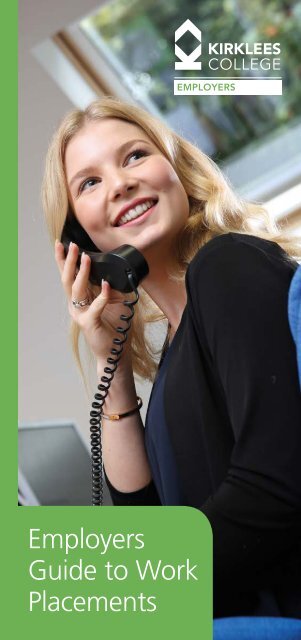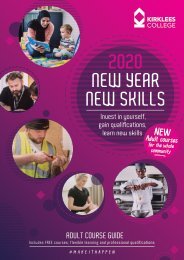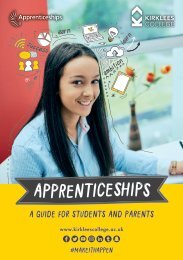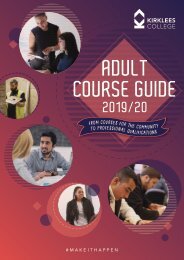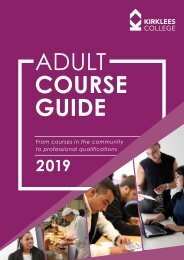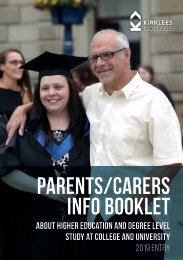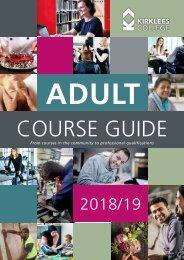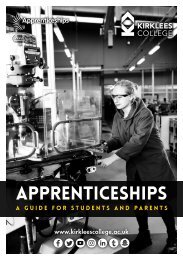Work Placements Employer Guide
Create successful ePaper yourself
Turn your PDF publications into a flip-book with our unique Google optimized e-Paper software.
<strong>Employer</strong>s<br />
<strong>Guide</strong> to <strong>Work</strong><br />
<strong>Placements</strong>
02<br />
<strong>Employer</strong> guide to<br />
work placements<br />
At Kirklees College we are dedicated to providing students<br />
with the best education experience available. In addition<br />
to supporting and challenging our students to develop<br />
their skills and knowledge in the classroom, we want to<br />
give them the opportunity to put these skills into practice<br />
and to gain valuable experience in the workplace.<br />
Only with your commitment and support can we better<br />
prepare our students to make the transition into work, and<br />
contribute to the development of a motivated, ambitious<br />
and capable workforce.<br />
This booklet offers general guidance and practical advice<br />
on what is involved when offering work experience to<br />
students. It is intended to help set up and plan structured<br />
placements which generate the maximum benefit for both<br />
employers and students.
03
04<br />
How can offering<br />
a work placement<br />
benefit?<br />
Benefits to Business<br />
The best place for young people to learn what is expected of<br />
them in the workplace is by spending time in that environment.<br />
Whilst there is a commitment from employers to support a work<br />
placement student there are some benefits to the organisation,<br />
including:<br />
Recruitment opportunities and building talent pipelines:<br />
<strong>Work</strong> experience placements enable employers to access a<br />
wider range of talent while also making a useful contribution to<br />
strategic talent management and workforce planning.<br />
Fresh ideas: Young people offer new ideas and ways of<br />
thinking, reflecting the interests and needs of the next generation<br />
of customers and consumers. Studying vocational qualifications,<br />
they offer knowledge of modern processes and current<br />
educational skills which are taught as part of their qualification.<br />
Staff development: Offering work experience placements can<br />
provide opportunities for existing staff to supervise and mentor<br />
a young person. This can help to develop their own professional<br />
and personal skills, and motivate.<br />
More engaged workforce: Providing work experience sends<br />
a positive message to the wider workforce about the values<br />
of the organisation. Engagement with the local community<br />
helps boost local economic development and can also lead to<br />
increased brand loyalty and profile, and in turn to greater profits.
05<br />
Benefits to Students<br />
By taking students on work placement, you are giving them an<br />
opportunity to be engaged, inspired and informed about what<br />
working life is like. It contributes to the local community and<br />
gives the student:<br />
First-hand experience of the workplace and different<br />
job roles: <strong>Work</strong> placements are an important way for young<br />
people to gain insight into the world of work. Time spent with an<br />
employer can broaden their knowledge of industries and sectors<br />
and help shape their future career decisions.<br />
Experience to build and strengthen their CVs: <strong>Work</strong><br />
experience is something employers value, alongside attitude,<br />
almost more than qualifications. A work placement can help<br />
break the cycle of not being able to get a job due to lack of<br />
experience.<br />
Increased confidence and employability skills: Completing<br />
the application process and taking part in job interviews to<br />
secure a work placement provides a valuable opportunity to<br />
practice and improve their recruitment skills.<br />
Builds skills: Through work placement young people learn the<br />
key attributes valued by employers, such as reliability, punctuality,<br />
enthusiasm and resourcefulness. They have the opportunity to<br />
see how their own skills and abilities translate to the workplace<br />
and develop skills specific to their chosen sector.
06<br />
<strong>Work</strong> placement<br />
FAQs<br />
What is expected from a work placement?<br />
<strong>Placements</strong> should be, wherever possible, useful to you and your<br />
business and seen by the student as ‘real work’. You need to<br />
ensure there is sufficient work to keep the student occupied and<br />
the work is varied to give them a range of experiences. Someone<br />
needs to be available to mentor the student throughout, advising<br />
them how to carry out tasks and there to lend a helping hand.<br />
How long do placements last?<br />
The duration of a placement will vary depending on the course<br />
requirements. They will typically be a minimum of 30 hours but<br />
this will be agreed between you, the student and the college.<br />
<strong>Placements</strong> should take place during normal college hours.<br />
If possible, full working days should be planned to provide a<br />
realistic experience.<br />
When can students attend a placement?<br />
Students have at least one day each week when they can attend<br />
a work placement. Often, the student will attend one or two<br />
days per week for a number of weeks which is called a ‘weekly<br />
placement’. Alternatively, placements are sometimes booked as<br />
a ‘block placement’ where the student attends every day for<br />
a week or more. The format of each placement will be agreed<br />
across all parties.<br />
Do I have to complete additional Health and Safety<br />
checks?<br />
The HSE states that any young person on a work placement is<br />
treated as an employee of the organisation for the time they are<br />
with you. It is expected that you will treat them the same as any<br />
other member of staff. If you already employ 16 or 17 year olds,<br />
you won’t need to take any further health and safety related<br />
action. Kirklees College may still need to carry out health and<br />
safety compliance checks though, as the safety of our learners<br />
is paramount to us.<br />
Source: http://www.hse.gov.uk/youngpeople/workexperience
07
08<br />
Do I need additional Liability Insurance?<br />
Existing employers’ liability insurance policy will cover work<br />
placements provided the insurer is a member of the Association<br />
of British Insurers or Lloyds, so there is no need to obtain any<br />
additional employers’ liability insurance if you take on work<br />
experience students.<br />
Source https://www.abi.org.uk/products-and-issues/products/business-insurance/<br />
liability-insurance/employers-liability-insurance/work-experience-students<br />
Do I have to pay them?<br />
Students working as a required part of a UK-based further or<br />
Higher Education course don’t qualify for the minimum wage<br />
if their placement with you or your organisation does not<br />
exceed one year and is classed as part of their course or study<br />
programme.<br />
Do I need to have a Disclosure and Barring (DBS) Check?<br />
<strong>Employer</strong>s do not need to carry out an enhanced Disclosure<br />
and Barring Service (formally CRB) check on members of staff<br />
supervising young people aged 16 or 17 on work placement. If a<br />
DBS is required for the young person, then Kirklees College can<br />
arrange that for you.<br />
What support will I get?<br />
You will be allocated a <strong>Work</strong> Placement Officer at College to<br />
liaise with about the placement. They will be able to answer any<br />
questions and go through the details of the work placement with<br />
you.<br />
If you are able to provide a placement to a student who has<br />
additional support in college then this will continue in the<br />
workplace with them to ensure they have the opportunity to get<br />
the most out of their placement.<br />
What do I do if a student is absent?<br />
Students have been instructed to inform their work placement<br />
employer immediately if they are likely to be absent. If a student<br />
does not arrive at all, is late without a satisfactory explanation,<br />
or you are in any doubt about a student’s attendance, please<br />
contact us.<br />
Do I need to complete any administration?<br />
Your <strong>Work</strong> Placement Officer will complete a health and safety<br />
checklist and any other documentation with you prior to the<br />
student starting at your organisation.<br />
As the placement comes to an end, the student will ask you to<br />
complete a ‘<strong>Work</strong> Placement Review’ to give them feedback on<br />
how they have performed and any areas for development.
09<br />
We believe in investing in young people<br />
and as part of this commitment we offer<br />
work experience every year. We find this<br />
rewarding and it allows us to look at a<br />
number of young people who are interested<br />
in accountancy, which gives us the potential<br />
to offer apprenticeships to the very best. The<br />
students we have offered work placements to<br />
have proved to be enthusiastic and pleasant.<br />
The support from Kirklees College is also<br />
excellent - If you are an employer, I would<br />
highly recommend giving work placements to<br />
Kirklees College students.<br />
Peter Sleigh, Sleigh & Story
010<br />
Creating a successful<br />
placement<br />
Plan the placement<br />
Liaise with your workforce to identify tasks or projects that might<br />
be suitable for a young person to do, and agree who will be<br />
responsible for mentoring and supervising them while they are<br />
with you.<br />
Allocating specific tasks for each day will keep students<br />
motivated, informed and engaged with the company process.<br />
Time could be spent in different areas to understand the business<br />
as a whole.<br />
Cover the basics<br />
On the first day all placement students should receive an<br />
induction to the workplace. This will help them to settle in<br />
quickly and learn about working life.<br />
A good induction should include:<br />
• An introduction to the organisation and the key people they<br />
will have contact with during their placement, including<br />
their workplace mentor or buddy<br />
• A tour of the facilities, including general housekeeping, first<br />
aid facilities and where the fire exits are situated<br />
• A briefing on the evacuation procedures and any other<br />
health and safety information they need to know<br />
• A clear plan of what they will be doing during their time<br />
with you – it may help to agree targets of what is to be<br />
achieved during the placement<br />
• Details of the company’s expectations on behaviour, dress<br />
code and confidentiality<br />
Challenge them<br />
Give the student real tasks to complete and provide them with<br />
the opportunity to shine and impress. Students can undertake<br />
any reasonable activity appropriate to their capability and will<br />
benefit more from getting hands-on.<br />
Find out what the student would like to achieve from their<br />
placement and agree outcomes they want to achieve while they<br />
are there.
011<br />
It is important to raise and address any issues as they arise.<br />
Feedback should be constructive and provided with sensitivity<br />
and encouragement.<br />
Giving feedback on how the student is performing will let them<br />
know how well they are doing and how they can develop further.<br />
This will build their confidence and motivate them to get more<br />
involved and learn.<br />
Keep in touch<br />
The <strong>Work</strong> Placement Team are available to offer help and support<br />
at any point of a placement. If you have any concerns about<br />
the student placed with you please contact the <strong>Work</strong> Placement<br />
Team.<br />
A final review<br />
At the end of the placement, arrange to complete a review<br />
with the learner. This will provide an opportunity to discuss if<br />
outcomes have been achieved and evaluate the benefits to the<br />
business of having a placement student.<br />
Students have a ‘work placement review’ which needs to be<br />
completed by the employer; this provides valuable feedback<br />
to the student about how they performed and could provide<br />
valuable information to help them prepare for future job<br />
applications.<br />
Placement providers include:
012<br />
Safeguarding<br />
At Kirklees College we have a duty of care to safeguard all our<br />
students and support the Government’s Prevent strategy.<br />
Safeguarding covers many areas, one of which is identifying,<br />
responding to, and supporting students who may be at risk to<br />
abuse, neglect, radicalisation or bullying.<br />
We have procedures in place to protect our students and a<br />
dedicated team to respond any concerns raised around their safety<br />
or welfare needs. If you have any concerns about a student on<br />
work placement or have any reason to suspect they may be at risk,<br />
please contact;<br />
Jude Flatley <strong>Work</strong> Placement Manager<br />
01484 437115<br />
Nathan Shaw Deputy Designated Safeguarding Lead,<br />
Huddersfield<br />
01484 437000 Ext: 7372 or 07969 504415<br />
Rory Hillas Deputy Designated Safeguarding Lead, Dewsbury<br />
01484 437000 Ext: 2409 or 07500 104155<br />
Other Business Services<br />
Kirklees College has a dedicated business team who work with<br />
employers and businesses across the region to help you access<br />
a wide range of training, development and services. We can<br />
also offer you advice on funding for training, provide facilities<br />
for events and develop tailor made courses to suit your needs.<br />
Apprenticeships can help the development of your staff and<br />
achieve long term success. We train over 2,000 apprentices<br />
across the region and we will fully support your business<br />
throughout the process including accessing Levy funding.<br />
We also offer part time professional courses for adults<br />
and industry-specific whether it’s for your own personal<br />
development or your staff.<br />
0800 781 3020<br />
employers@kirkleescollege.ac.uk<br />
www.kirkleescollege.ac.uk


